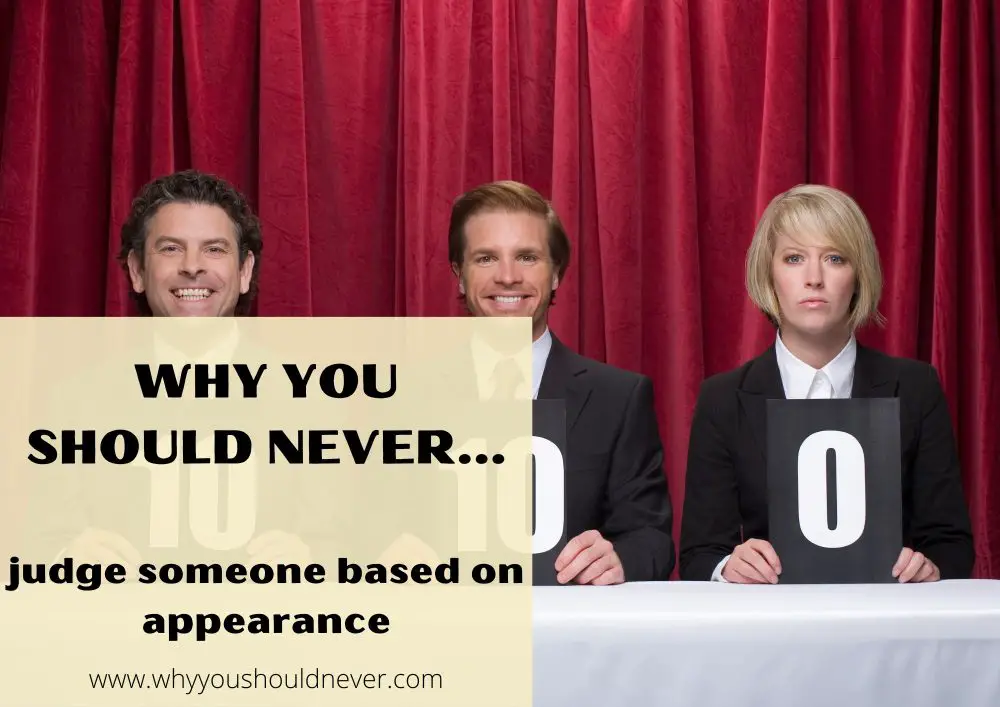![]()
Why You Should Never Judge Someone Based On Appearance
You know that old saying, “don’t judge a book by its cover?” If you think it’s about not jumping to conclusions about novels with crummy artwork, bless your cotton socks. It’s actually about people and their appearances.
In a world that’s been inundated with picture-perfect social media feeds, Photoshopped reality TV stars, and filtered everything, we’ve become pre-programmed to size up people at warp speed based on their looks.
But why is this a bad thing, I hear you ask. Well, why indeed? Let’s explore below.
7 reasons why you shouldn’t judge people based on appearance
1. Appearances can be deceptive
You know those magic eye pictures? The ones that look like a psychedelic mess until you squint and suddenly there’s a 3D dolphin leaping out at you? People can be like that. There might be a Nobel Prize-winning physicist under that mohawk or a benevolent philanthropist behind those tattoos.
It’s the classic iceberg analogy. What you see is just the tip. Underneath, there’s a colossal chunk of experiences, skills, and talents.
2. Our brains aren’t as reliable as we think
Think you’ve got a good read on someone because of your incredible “people-reading” skills? Well, you might want to deflate that ego balloon a tad. Cognitive science shows us that our brains have a knack for taking shortcuts, resulting in cognitive biases.
The “Halo Effect,” for instance, is our tendency to assume someone attractive is also kind, smart, or successful. Sure, it’s efficient, but it’s about as accurate as reading tea leaves for the weather.
The truth is, your biases could easily deceive you into thinking something that isn’t true, which could get you into trouble, depending on the circumstances. Ever fallen for the beautiful person only to find out that they’re actually a psycho? Nope, just me?
3. Cultures and subcultures influence our perceptions
How we perceive appearance hinges heavily on cultural and societal contexts. What’s seen as “attractive” or “respectable” can flip-flop wildly from one society to another or even within different subcultures of the same society.
Thigh gaps or thunder thighs, crew cuts or dreadlocks, body ink or unblemished skin… all are valued differently, depending on where you’re standing. So, unless you’re an anthropological genius, your judgment will be wearing some pretty heavy blinders.
4. People evolve, so does their style
Remember your goth phase? Or that regrettable neon tracksuit phase? Or that “enough hairspray to hold up a skyscraper” phase? Point being, we change. Our tastes, experiences, and circumstances evolve, and so does our outer packaging.
Judging someone based on their current style phase is about as shortsighted as it gets. If you wouldn’t want someone to judge you based on the person you once were (for that brief time when you didn’t know any better), then don’t do it to others.
5. You miss out on possible connections
By making hasty appearance-based judgments, you may overlook a potentially rewarding connection. That lady with the eccentric fashion sense could be your future best friend, or the guy with the scruffy beard might share your obsession with 16th-century baroque music. Don’t let superficial impressions rob you of these serendipitous connections.
6. You don’t know their story
It’s human nature to weave narratives around what we observe. But when it comes to people and their appearances, our hasty story-telling can be as off-target as a drunk dart player. Every wrinkle, every scar, every quirky sartorial choice has a story behind it.
Maybe that grunge look is a rebellion against an uptight upbringing. Perhaps those laugh lines are the souvenirs of a life filled with joy. Or maybe the budget-brand attire is a testament to frugality learned from a poverty-stricken childhood.
You don’t know until you ask, listen, and empathize. And you won’t do any of that if you’re simply writing people off at first glance.
7. It’s a reflection of your character, not theirs
Lastly, and this is a bit of a zinger, when you judge people by their appearance, it reveals more about you than them. It shows your inability to look beyond the surface, to be open, and to respect individuality. And that’s not a particularly flattering look on anyone.
Wrapping things up
Well, we’ve traipsed quite the distance, haven’t we? We’ve delved into cognitive biases, the fickle nature of cultural perceptions, the evolution of personal style, the potential magic of chance connections, and the revealing nature of our judgments. Oh, and we also got to touch on the importance of understanding other people’s stories.
But what’s the real crux of this whole spiel? Simply this: people are as varied, as complex, and as fascinating as a night sky filled with constellations. And when you judge them based on mere appearances, you’re essentially trying to understand that grand cosmic display with nothing more than a glance through a peephole.
So before you let your mind wander into the realm of rapid-fire judgments, take a breath. Give people a chance to show you their universe. Because remember, just like you can’t judge a book by its cover, you can’t size up the cosmos from a keyhole.
